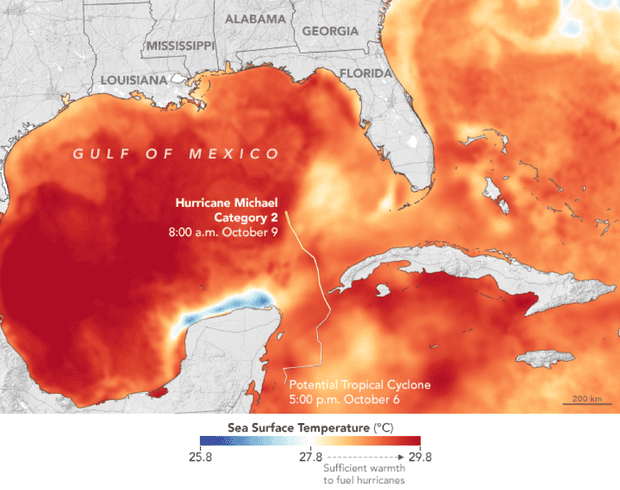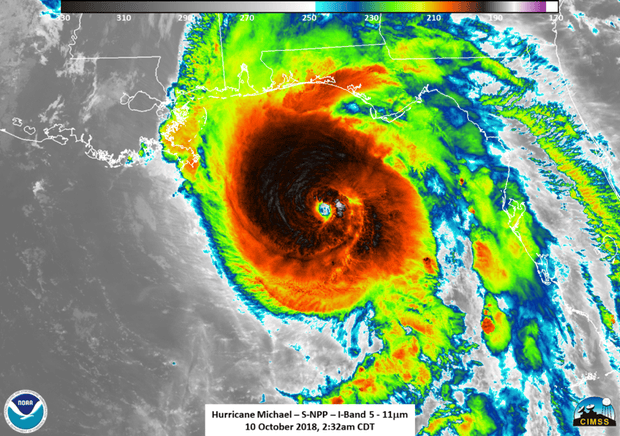Victims of Hurricane Michael voted for climate deniers
Posted on 11 October 2018 by John Abraham
Floridians are staring down a very powerful Category 4 typhoon that is causing extensive damage. The high winds, heavy rains, and storm surge will cost billions of dollars.
We know that climate change is making these storms stronger. The storms feed off of warm ocean waters, and those waters are much warmer now because of climate change. I have written about the science in more detail here and here. But basically, Michael strengthened because it passed over really warm waters. Waters that were hotter because of human-caused warming.

Water ocean temperatures around Florida as Hurricane Michael evolved. Illustration: NASA EOSDIS/LANCE
Predictably, the hurricane strengthened as it hit shore. As I write this, Michael is coming ashore and the pressure is still falling (low pressures in a hurricane signify a stronger storm). It appears that Michael may have the third-lowest pressure for a hurricane hitting the USA.

Infrared image of Hurricane Michael Photograph: NASA/NOAA/UW-SSEC-CIMSS, William Straka III
It is a wonder that a state like Florida, which will get pummeled by Michael, could vote for someone that denies climate change. Think of how backwards the situation is – the Florida Department of Environmental Protection has reportedly been banned from using the terms “climate change” and “global warming”. This policy reportedly went into effect when Florida elected a science denier, Rick Scott, to governor.
Rick Scott has been condemned by people in Florida for his backward stance. It is climate denial like his that has contributed to the suffering of residents in the state.
It’s not that my colleagues haven’t tried to help Governor Scott understand how his policies hurt his state. A few years ago, scientists met with him and urged him to take climate change seriously. He remained silent.
It isn’t that the local media hasn’t tried. Major newspapers have called upon Rick Scott to take action on climate change. But to little avail. Maybe it’s because Rick Scott invests in companies that oppose climate change regulations?
It isn’t that his political opponents haven’t tried. Recently, Florida Democrats petitioned Rick Scott to acknowledge climate change.
Fortunately, while Rick Scott is now running for Senate, he’s being challenged by Democrat Bill Nelson. He understands science and believes in facts. Nelson writes,
Climate change is real, and we must take action to protect ourselves. Denial of this scientific reality is simply not an option, especially in Florida.
Rick Scott isn’t the only politician from the state of Florida to reject science and diminish climate change. Senator Marco Rubio has as well.
Florida voters could put an end to this nonsense. In the current race for state Governor to succeed Scott, Republican candidate Ron DeSantis is ignoring science. He recently claimed that climate change is not an issue for states to mitigate. Say what?
Let’s hope Ron DeSantis loses. His opponent is Andrew Gillum, who is clear as day when he says,
Climate change is real, it is impacting Floridians directly, and we will not be silenced on the matter. When I’m Governor, we will not just talk about climate change — we will put Floridians to work to make our state more energy independent and resilient and transform our state into the Solar Capital of the United States!
But it’s not just Florida; there are other states getting hit by Hurricane Michael that are also led by climate deniers. For instance, Georgia will be hit by Hurricane Michael. One of the senators there, David Perdue, congratulated President Trump when he pulled out of the Paris Climate Accord. Georgia’s other Senator, Johnny Isakson also denies the science. He too supported President Trump’s reckless actions.
At the congressional district level, the denial continues. Republican Representative Barry Loudermilk was pleased when President Trump walked away from the Paris Agreement. His opponent, Flynn Broady trusts and understands science, however. His position could not be any clearer as he writes,
We have the technology and knowledge to develop and place into practice renewable energy sources, reduce carbon emissions, and move our energy needs away from carbon fuels. We owe it to the world to participate in the Paris Agreement and the Kyoto Protocol. As the leading industrial nation we must lead the effort.































 Arguments
Arguments






























The title of this post seems a little insensitive. Perhaps it could be changed to "Victims of Hurricane Michael may prioritize climate change in future elections," or something more positive.
Evan @1 - The headline of the Guardian article has now been changed to "Victims of Hurricane Michael are represented by climate deniers" after John Abraham contacted the editors of the article as mentioned on Twitter here.
Thanks Baerbel for the clarification. That makes more sense and seems more respectful to those who are suffering.
Recommended supplemental reading:
GOP senators from hurricane-ravaged states mock UN’s climate change warning by Joe Romm, Think Progress, Oct 11, 2018
It may be a wonder, but a psychologist (even of the armchair sort) might not be surprised. In his book Collapse: How Societies Choose to Fail or Succeed, author Jared Diamond cites an example of how denial works:
Therefore we should not be surprised to find that climate change denial would be high in the US state which gets hit by the most hurricanes and is already experiencing the effects of man-made sea level rise. Floridians are metaphorically living "directly below the dam" of climate change. Of course direct risk is not the only factor, as the perception of Floridians is also mediated by years of Republican disinformation campaigning.
California experiences climate change in the form of increasing droughts, floods, and wildfires, but California's urban blue (Democrat) majority out-votes its red (Republican) rural minority on a state level. The irony carries over there as well, since rural Californians get hit the hardest by climate change. Forest fires and crop failures occur in the countryside, not in the cities. To a first approximation, the Californians who experience climate change most directly are the most in denial about it.
On "insensitivity" - I don't feel sorry for tobacco smokers who die from tobacco-caused diseases. They ignored the clear warnings of science and got the consequences. Similarly, I don't feel sorry for people who live lavishly all their lives off fossil fuels and then get the consequences. Everyone who consumes the benefits to self from burning fossil fuels dumps an increment of harm onto everyone else. If we lived in a just world, individuals would experience harm from climate change in proportion to their individual contributions to climate change. Instead the opposite tends to occur, with the wealthiest individuals and countries suffering the least from climate change, and the poorest individuals and countries suffering the most.
In most natural disasters to hit the USA, the poor and people of color tend to suffer disproportionately, those who contributed relatively less to climate change (although in most cases still much more than their globally equitable carbon fair share, as the USA per capita average emissions are so horrendously high). In the USA, when the poor and people of color head to the polls, and their votes aren't suppressed by Republican rigging, they tend to vote Democrat. Therefore, to the extent that we want to avoid being insensitive, we should look at who the victims are and who they voted for, before lumping them in with the narrow plurality of Floridian voters who went for Trump. In 2016, Trump received 49.02% of the vote in Florida, while Hillary Clinton received 47.82%.
Because of the winner-take-all nature of American politics, it's easy to over-generalize about an entire state. While Trump/Clinton was not directly a referendum on climate change - the issue wasn't even mentioned in the Presidential debates, and hardly came up in news coverage of the campaign - if we interpret the vote as some measure of attitudes toward climate change, Florida would be in almost a dead heat on the issue.
Let's also not forget that Trump fueled his meteoric rise by being verbally abusive to everyone - women, gays, Mexicans, blacks, war heroes, persons with disabilities, many of his fellow Republicans, etc. Anyone who voted for Trump can hardly complain about getting a taste of their own verbal medicine. Republicans mock liberals every day. Why shouldn't we ridicule the stupidity of people who deny climate change while living in the US state most at risk from climate change? Every coastal city in Florida could be underwater by the end of this century, for crying out loud. When greedy, self-interested humans finish melting the ice caps, most of the state will be gone.
Fortunately Michael is a one off event. A one in a thousand year event, not likely to happen again in our lifetime. Besides climate change is all a hoax.
How do we know
The president told us so
(Sung to the tune of that sunday school ditty, The Bible Told me So)